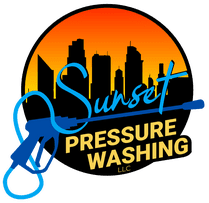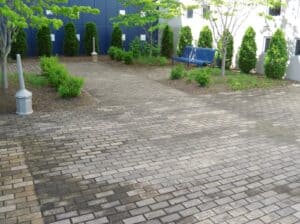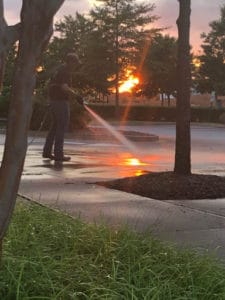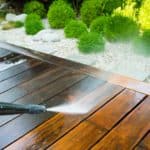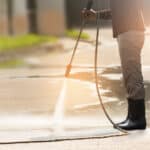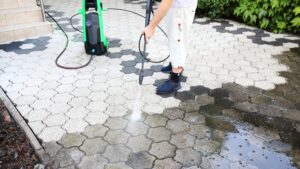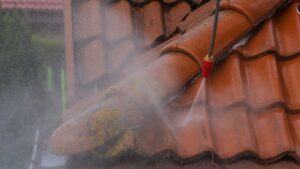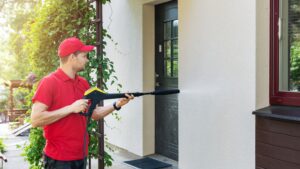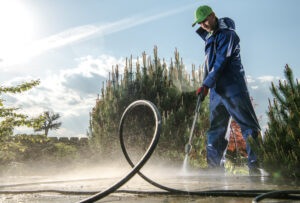
Paver Cleaning Done Right: Tips for Restoring Their Beauty
How to do Paver cleaning right, you’ve heard of landscaping, but have you heard of hardscaping?
Hardscape can be thought of as elements in your yard that are “hard”. For example, pavers for paths, patios, and driveways.
Pavers make a great addition to your hardscape. They come in different styles, shapes, designs, and sizes. They are made from concrete, natural stone, and brick.
Whether you’re looking to add value to your home or simply enjoy the outdoors, pavers are a great way to go.
To keep your pavers looking good year-round, you will need to clean them. Since they’re exposed to many elements, you should pressure clean them at least once a year.
To get the best results, you will want to hire a professional. There’s nothing they know better than how to keep your pavers clean.
Discover how to do paver cleaning the right way. Spoiler alert: you’ll need a professional.
Is It Okay to Pressure Wash Pavers?
Yes. Pressure washing your pavers is one of the most effective ways to restore the look of your pavers. Pressure washing removes all the dirt, grime, moss, and weeds out of your pavers that an ordinary outdoor brush can’t.
Some suggest pressure washing can damage the paving. This isn’t true. As long as it’s done carefully, cleaning pavers by pressure washing is effective – as long as you do it right.
By following a series of cleaning guidelines, you can take the necessary steps to clean and protect your pavers. One of these steps includes re-applying sealant – a substance that increases pavers’ durability.
Sealing your pavers helps to:
- Enhance the look
- Helps prevent stains and signs of aging
- Greatly extends the life of the material
- Prevents weed growth between joints
- Prevents mold and moss formation
- Helps settle the material between the pavers
- Protects the pavers against extreme weather conditions
If you don’t feel confident in pressure washing your pavers, it’s best to let the professionals handle it.
An unskilled person might use inadequate pressure and accidentally crack it. They may also accidentally remove joint sand integral to ensuring stability.
Professional pressure washers are trained to avoid mishaps and equipped with state-of-the-art equipment to ensure safety.
What Pressure Should I Use When Doing Paver Cleaning?
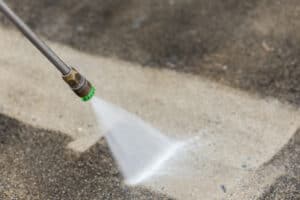
PSI stands for “pounds per square inch”. It is a common unit of pressure that refers to the amount of cleaning pressure the machine can produce.
GPM stands for “gallons per minute”. It is the amount of water that is coming from the machine.
When choosing a pressure washer, PSI and GPM are just as important as the other. For a beginner, 1000 to 1500 PSI with a flow rate of at least 4 GPM is ideal.
This PSI pressure is easy to manage and will not cause damage to your pavers.
Professional pressure washing companies will use higher pressure and flow rate. It is common to see high-pressure models with 3000 to 6900 PSI. However, these are more often used in commercial and industrial settings.
For residential settings, 3000 PSI is more likely. Although this depends on the condition of your pavers.
How Do I Make Pavers Look New Again?
If you’re pressure washing pavers by yourself, you’ll want to take the necessary steps to avoid any issues.
Damage caused by pressure washers is typically the result of the wrong nozzle, using higher pressure, and holding the wand too close to the pavers.
To avoid these issues, follow this guide to help you clean your pavers without damaging them.
Step 1: Try Other Methods First
If you’re new to pressure washing, it might be better to use a different cleaning method. Depending on the condition of your pavers, using a broom or a garden hose might be enough to clean the area.
Use a regular nozzle to direct the spray. The pressure might be enough to clean the area in question.
There are numerous articles online with tips and tricks to clean pavers without a pressure washer. Keep in mind the result may not be as you intended.
For the best results, you will need to hire a good pressure washing company. As a novice, pressure washing is best left to the experts.
Step 2: Choose the Right Equipment
Having the right equipment makes all the difference. If the above tips don’t work and you need to use a pressure washer, you must have the right gear.
Choose a pressure washer with a pressure of at least 3000 PSI and a flow rate of at least 4 gallons per minute (GPM).
A pressure washer with less power, around 1500 PSI, will still clean your pavers. But isn’t as effective. However, if you’re new to pressure washing, 1500 PSI may be a good start.
Now, you need to choose the appropriate nozzle. There are a few different types to choose from. Each will allow you to clean several types of surfaces.
- 0° red nozzle
- 15° yellow nozzle
- 25° green nozzle
- 40° white nozzle
- 60° black nozzle
Avoid using the 0° red nozzle. This nozzle creates a powerful jet for removing tough stains. It can cause serious injury if used inappropriately.
For your pavers, the 25° green nozzle is your best bet. It is used for the general cleaning of most surfaces and has a wider spray which is great for sweeping away debris, mud, leaves, and other grime.
It can also be used on decks, driveways, cars, boats, and more.
Step 3: Practice Makes Perfect
Once you’re ready to rock and roll, you should do a practice run. This is especially true if you’re new to pressure washing.
Practice on a surface that will not get damaged, such as a patch of dirt or an area of lawn.
Always keep the pressure washer in motion. This means not holding it in one spot for more than a few seconds. Hold the nozzle at least one foot from the surface and spray at an angle.
Practice a gentle sweeping motion to evenly distribute the water across the surface. Once you feel confident enough, start by cleaning a concealed area. If something happens at least it won’t be completely visible.
Step 4: Clean Your Hardscape
First, you will want to prep your area. Use a broom to sweep away leaves and other debris. Remove any outdoor furniture, too.
Next, you should wet the area. You can do this with a garden hose or bucket. Make sure every part gets wet.
Then, choose a cleaning solution. This will depend on what kind of dirt and stains you’re trying to remove.
For example, ordinary detergents will remove surface stains. But there are also industrial-grade detergents for deeper cleaning.
After this, set up your pressure washer with the right attachments and settings.
To clean thoroughly, use a sweeping motion to clean the surface. Hold the nozzle at least 12 inches away at all times and spray at an angle. Never linger in one spot for too long.
If you are using detergent to clean your surface, direct the runoff away from any lawn or garden beds. Instead, direct it towards a dirt or gravel area.
If you’re just using water, you can direct the spray towards your lawn, flower, and/or garden beds.
Step 5: Rinse Your Hardscape
After pressure cleaning your surface, it’s time to rinse off the area. You can use your pressure washer to do this. Although you may need to adjust the settings and nozzles.
Alternatively, you can use a garden hose or a bucket of water. Although this is a little more labor-intensive.
After your pavers are dry, marvel at the difference pressure washing can do to your hardscape.
Tips for Cleaning Different Types of Pavers
The cleaning process doesn’t vary too much from one type of material to the other. However, there are some specific things to keep in mind when cleaning your surface to avoid damage to your pavers.
Natural Stone
Avoid harsh chemicals when cleaning natural stone. Abrasive or acidic chemicals can damage your pavers. While it might not cause any noticeable damage, it can lead to the applied sealer breaking down.
If this happens, you will need to have the stone resealed more often than usual. To avoid damage, it’s best to stick with detergents or a vinegar-water-based solution.
Brick
Most pavers only need to be cleaned once a year. However, brick may be an exception to the rule.
Brick is porous and absorbs moisture. This means they will need to be cleaned more often to prevent stains from ingraining deeper into the brick.
Avoid using harsh chemicals to remove stains. These chemicals can eat away at the paved surface of your pavers. Over time, it will also wear down their integrity.
The safest cleansing mixture is warm water and a mild household cleaner, like a dish detergent. Alternatively, vinegar and bleach are also effective household cleaning solutions.
Concrete
Hydrochloric acid is a popular heavy-duty cleaner for concrete pavers. It is effective in removing stains that dissolve on contact with the acid. However, the result is clean, but weaker concrete pavers.
Instead, opt for a natural cleaning solution. Water, baking soda, and a little detergent will give your concrete a super clean finish. Alternatively, any mild, non-acidic cleaning solution will work just as well.
The Benefits of Paver Cleaning
Pavers give your backyard a major glow-up. They help to beautify outdoor spaces and cut down on yard maintenance. This gives you more time to enjoy outdoor living and less time maintaining it.
Of course, you still need to maintain your hardscape – just not as often. The pros of cleaning your pavers outweigh the cons tenfold.
Here are some of the top benefits of regular paver cleaning and maintenance.
Improving Other Parts of the Property
Dirty pavers can detract from other areas of your property too. Think about it. A paver driveway lined with flowers should be a beautiful sight, right?
But your flowers will look a lot less impressive when you’re distracted by the stained pavers they’re bordering.
Making Cleaning Easier

With continued upkeep, your cleaning responsibilities won’t be as intimidating. Over time, you may even enjoy keeping your pavers clean.
And when you don’t, you’ve always got professional backup.
Paver Cleaning Boosts Curb Appeal
Pavers can play a significant role in the curb appeal and value of your home. Pavers can make a grand statement leading up to your house, or alongside your driveway to widen it with a decorative border.
But boosting your curb appeal will only happen with regular paver cleaning. You can do this with weekly cleaning and hiring a professional company to pressure wash once a year.
Whether you’re looking to sell your home or want to enjoy your outdoor space, pressure washing will do wonders.
Convenient and Cost-Effective
Poorly maintained pavers can lead to structural issues later on. Weeds in your pavers are not only unsightly, but they will also cause structural damage to your patio or walkway.
People often delay or avoid professional pressure washer companies because they believe that it is too expensive. This is often not the case. Professional companies already have the proper equipment and cleaning solutions to restore the appearance of your pavers.
They also know the best techniques to avoid any damage. This is much easier than hiring equipment and taking the time to learn how to use the pressure washer. Who knows how long that might take!
Paver Cleaning Eliminates Damage
Paver washing isn’t just about improving appearances. It’s also about cleaning the dirt, debris, mold, and other materials that can lead to health issues.
Enough mold can trigger nasal congestion, sneezing, coughing, respiratory infections, and worsen asthma conditions. While some types of algae can produce toxins. Exposure to high levels of algae can cause diarrhea, nausea, or vomiting.
Not to mention skin, eye, or throat irritation.
Tips for Paver Cleaning and Maintenance
During your yearly paver clean, it’s important to continue with regular maintenance. To keep your pavers looking their best in-between professional cleanings, follow these helpful tips.
- Don’t allow moss, weeds, or algae to develop
- Regularly sweep your pavers
- Occasionally pressure clean your driveway or patio
- Always maintain good drainage
Poor drainage can lead to sunken pavers, organic growth, damage to the surrounding landscape, and water pooling around the foundation of your property.
To assist good drainage of your paved area, install drains. This will allow the water to be diverted to another area, away from the home.
The Dangers of DIY Pressure Paver Cleaning
Pressure washing has seen a rise in popularity in recent years. This may have something to do with the increased availability of pressure washing machines from hardware stores.
However, this has led many “Weekend Warriors” to believe that pressure cleaning is easy. While doing it yourself may seem like you’re saving money, when done wrong it can do more harm than good.
As a result, there has been an uptick in pressure cleaning-related accidents and injuries. Some of the most common dangers associated with DIY pressure cleaning include:
- Major cuts, brushes, and skin lacerations
- Chemicals infect open wounds and cause bacterial infections
- The sheer force of the water pressure can push you off ladders and roofs
DIY pressure washers can also do severe damage to property such as:
- Smashing windows due to water pressure
- Damaging the seal between window glass and frames
- Damaging or completely removing paint
- Loosening, damaging, or washing away tiles
- Loosening pieces of wood and causing splinters and uneven surfaces
- Carving chunks out of concrete flooring
- Causing electrocution or electrical damage
Not all DIY pressure washing will end in the above. However, to best avoid any kind of damage you should hire a professional instead.
By the time you’ve calculated the damage you created, it may end up costing more than hiring a professional.
When Is It Time to Call In the Pros for Paver Cleaning?
Preferably before you smash your windows and wash the paint clean off your home.
DIY’ing can be appealing. Watching the dirt wash away is a very satisfying experience in itself. However, you have to ask yourself whether it’s worth all the hassle?
You may surprise yourself and become a pressure washing pro. But more often than not, you won’t. Sorry!
To prolong the lifespan of your hardscape, as well as reduce the risks of property damage, consider leaving it to the experts. When done with the right equipment and technique, pressure cleaning can completely transform your pavers.
Not convinced? Let’s take a closer look at some of the benefits of hiring a paver cleaner company to do the dirty work for you.
The Benefits of Hiring a Paver Cleaning Company
Yes, you can clean your pavers using DIY techniques, but it’s not always that easy. Cleaning pavers often requires a special set of skills.
Like Liam Neeson, professional pressure cleaners are equipped with a special set of skills that allows them clean pavers and avoid damage.
Hiring a paver cleaning company is a far better decision than attempting to do it yourself. Here are the reasons why.
- Safe removal of pollutants and contaminants
- A professional opinion on the condition of your pavers
- Expert advice on caring for your asset
- The best possible result for mark and stain removal
- Cost-effective and convenient
- Quality guaranteed
A professional paver cleaning company uses industry-leading technology. Their equipment is designed to provide the most effective and safest cleaning result for your pavers.
This also guarantees the best possible surface for resealing.
What Is Paver Sealing?
Paver sealant is an important maintenance tool to keep paver patios, walkways, and driveways looking as beautiful as they did the day they were first laid.
Sealants can prevent stains and other signs of aging from occurring. If you choose not to seal your pavers they may suffer the effects of erosion, weed growth, mold build-up, and discoloration. You may even notice an uneven consistency on the surface of your pavers.
Paver sealing is achieved by spraying a generous coat of sealant continuously and equally along your pavers. While also making sure that there is no excess product in the joints.
Wait 24 hours before applying another coat. Then another 24 hours to see the final look.
Tips for Applying Paver Sealer
Here are a few helpful tips to apply paver sealer successfully:
- Apply sealer when the weather is dry, but not in direct sunlight
- Don’t let a section dry before you finish
- Invest in a high-quality sealer to avoid discoloration
- Wait for 24 hours before allowing foot traffic
- Wait for 3 to 4 days before allowing wheeled traffic
Pressure cleaning and sealing your outdoor surfaces will help protect your pavers for years to come.
Paver Cleaning? Call In the Pressure Cleaning Pros
If you thought house cleaning was hard, you haven’t tried exterior cleaning! Paver cleaning requires more skills than you may realize.
Too many homeowners are attempting to DIY pressure clean their pavers with disastrous results. Too much pressure and you can damage your pavers. Not enough pressure and you’re not cleaning them properly.
For the best paver cleaning results, it pays to bring in the pressure cleaning pros.
Pressure washing near me? Don’t worry, we have you covered.
Sunset Pressure Washing offers all types of cleaning and maintenance services, including walkwaycleaning, rust removal, gum removal and other services. Our crews only use commercial-grade pressure washing equipment. We can remove dirt, grime, moss, and weeds without damaging one single paver.
Pressure washing in Greenville SC just got a whole lot easier!
Ready to restore your pavers? Contact us for a quote today.
